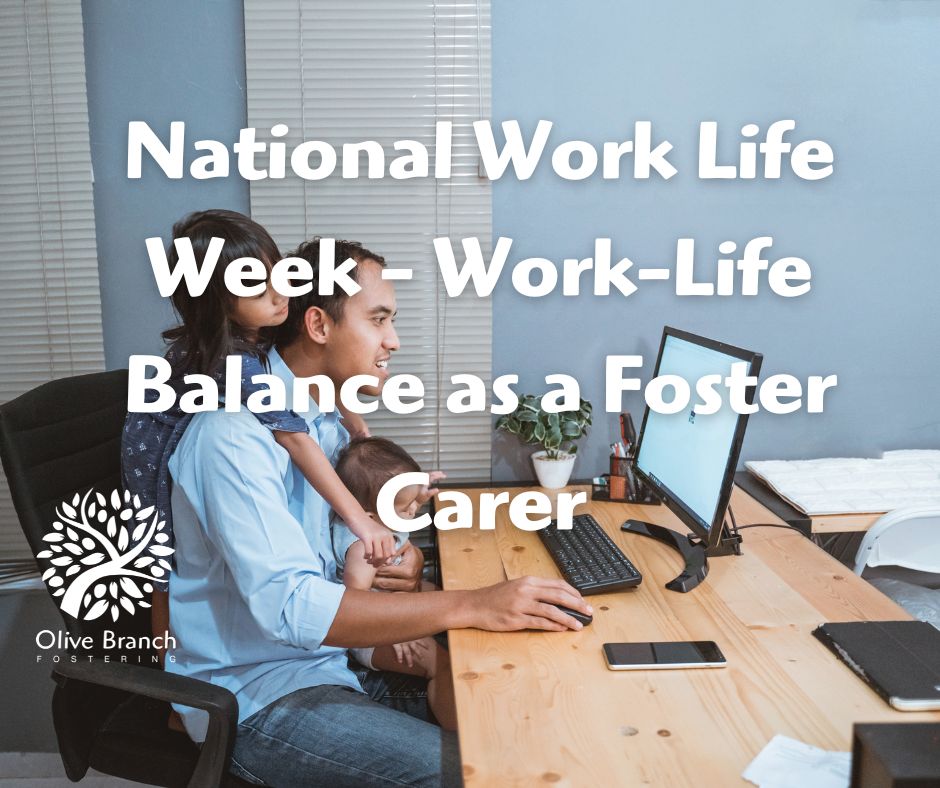National Work Life Week - Work-Life Balance as a Foster Carer
Date published
08 October 2024
08 October 2024

National Work Life Week 2024 takes place between the 7th and 11th October. This annual campaign is led by Working Families - the UK’s national charity for working parents.
In today’s blog we’re looking at why National Work Life Week matters and how to achieve work-life balance as a foster carer.
The aim of National Work Life Week is to raise awareness of wellbeing at work and get everyone talking about work-life balance, what it means, and how to find it.
Working Families also encourages employers to take part in National Work Life Week by providing wellbeing activities for their employees and showcasing their flexible working policies.
This year’s theme for National Work-Life Week is ‘flexible working’, and the charity hopes to highlight the need for flexible working and how it’s possible for any role.
They’re asking people to share what flexible working means to them, and to get involved in discussions online using the hashtags #WorkLifeWeek and #MyFlex.
So what actually is work-life balance and why is it so important for families?
Work-life balance is about being able to prioritise what’s important to you personally without it affecting your work and not allowing your work to negatively impact your home life.
For many families, this means achieving a fine balance between time spent on paid work and time spent caring for children or running a home. It’s also about still having time for the activities you enjoy, and to spend with the people you love.
Signs of a good work-life balance might be:
Not worrying about work when you’re at home (or vice versa!)
Having clear boundaries so that work doesn’t interrupt time with your family.
Being able to take time off when you need it (for example, not feeling you have to work through illness or cancelling holiday plans due to work pressures or deadlines).
Taking regular breaks, both throughout the working day and across the year.
Having time for your hobbies and interests outside of work.
Spending quality-time with family away from work distractions.
Not feeling overwhelmed by your responsibilities.
Practising self-care, such as exercising, eating well, and getting enough sleep.
Having a support network you can turn to.
Having good work-life balance is important because it helps to manage stress and reduce the likelihood of burnout, both of which can negatively impact physical and mental health.

Becoming a foster carer can be a great way to achieve work-life balance.
While some foster carers continue to work outside of the home alongside fostering, many carers choose to move away from their existing roles and focus solely on foster car.
As a foster carer you’re classed as self-employed and you’ll work from home. Fostering is flexible, with no set office hours or a commute to worry about.
For many foster carers, this means they can be around during the day for birth children or grandchildren and are able to drop off and pick up from school or nursery. It also allows more flexibility to support older children or other family members if needed.
As a foster carer, no two days are the same, meaning you’ll need to be adaptable, but in return, it can be incredibly rewarding. Plus you’ll get support, training, and time off if you need it. This might be in the form of respite placements or breaks in-between fostering placements. You’re also fully in control and can choose what type of fostering placements you want to offer.
Of course, fostering can present challenges to work-life balance too. As a foster carer, you’re never ‘off duty’ and a foster child might need you at any time of day or night!
Depending on the child, there might be lots of meetings or medical appointments to attend. Some foster children also have contact with their birth family so you need a flexible attitude and accept that some days or weeks might be busier than others. However, with a support network in place, and with your fostering team behind you it’s easier than you might think to establish a routine and still find time for yourself and your family alongside a career as a foster carer.
If you’re a foster carer who’s struggling to find the right work-life balance alongside your caring responsibilities, these tips could help.
An important part of caring for others is to know what your limits are, and this applies to foster carers too. When it comes to fostering placements or other commitments, don’t be tempted to take on more than you know you can handle.
As a new carer you should be encouraged by your social worker to think carefully about the type of fostering placements you can offer, and to build a fostering career that best suits your family, lifestyle and existing commitments.
Everyone needs a break now and then! Try to build a little -’me time’ into each day to avoid becoming run-down or burnt out.
If you need a longer break, ask your social worker about the possibility of respite care. You might also be able to get a close friend or family member approved to look after your foster child/ren, whether it’s for a few hours or an overnight stay.
You can also take breaks after a child moves on if you need some time to yourself in-between placements.

Having a good support network is crucial when you’re a foster carer. As part of the approval process you’ll be asked about your support network. This could be family, friends or colleagues, and includes anyone you might turn to for practical or emotional support.
Fostering is a unique situation, and the only people who truly understand are those living it - i.e. other foster carers! Try to meet and befriend fellow carers - either through support groups or via your fostering agency.
All foster carers will need a little extra help at some point. Asking for support when you need it is a good sign as it shows that you’re willing to learn and want the very best for the child/ren in your care.
Your fostering agency will be the ones who are supporting you throughout your fostering career so it’s vital that you choose the right one and are satisfied with what they can offer you. If you’re struggling to decide, our recent blog about what to consider when choosing a fostering agency might help.
Here at Olive Branch Fostering, we understand how important it is for our carers to achieve a good work-life balance.
That’s why we offer a comprehensive package of benefits to our foster carers. This includes:
Ongoing training
Generous fostering allowances
Regular support groups and activities
Outings and events for our families
A rewards scheme
24/7 support from our dedicated team of social workers
If you’re looking for a better work-life balance and are considering becoming a foster carer, we’d love to hear from you. Speak to us about fostering today by calling 01706 558910 or fill out an enquiry form and one of the Olive Branch team will be in touch.
News
08 October 2024